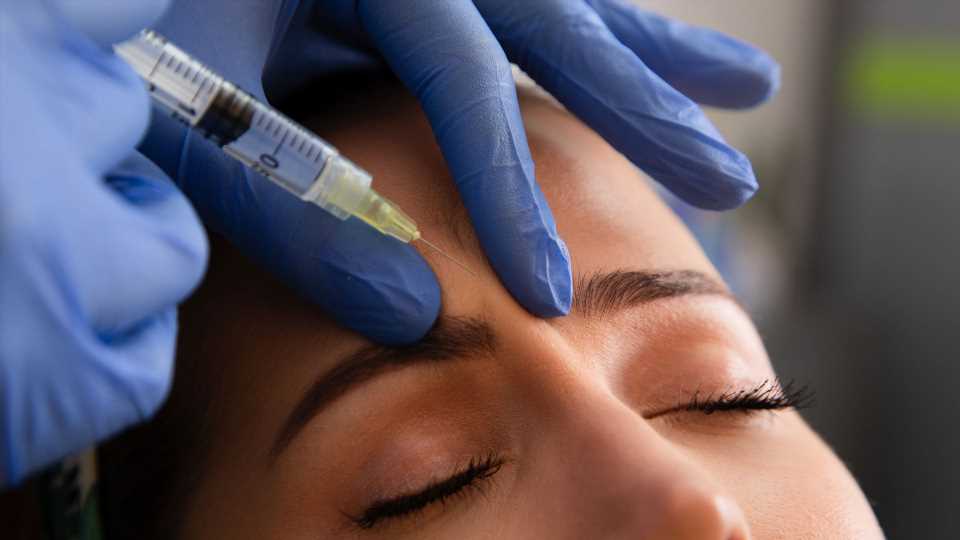BOTOX injections are one of the most popular cosmetic treatments available today.
But do you know what else it can be used for, how it works and how long it lasts? Read on to learn more…

What is Botox?
Botox is a drug made from a toxin produced by the bacterium Clostridium botulinum.
The substance is injected into the skin which is known to inhibit muscle movement, and that can prevent wrinkles from developing or worsening.
The medicine in Botox injections is made from the same toxin that causes a type of food poisoning called botulism.
But the forms of purified botulinum toxin used by licensed healthcare providers meet medical control standards.
Read More on Botox

I was addicted to filler & got it to sort out my eye bags – it was a total fail
Therefore the bacteria toxins used for medical purposes are not harmful if used correctly.
What is Botox used for?
Botox injections work by weakening or paralyzing certain muscles or by blocking certain nerves.
The effects last about three to twelve months, depending on what you are treating.
The most common side effects are pain, swelling, or bruising at the injection site.
Latest in Fabulous

Home guru shares the best B&M product to get rid of kitchen counter crumbs

Woman rummage through her neighbours’ bins to nab anything they've thrown away

I quit school with 2 GCSEs to become a female welder – now I make £80k a year

Woman stopped bleaching hair & getting lip filler & now loves how she looks
You could also have flu-like symptoms, headache, and upset stomach.
There is also the possible risk of temporary drooping eyelids if it is injected into the face.
And while it is immensely popular for aesthetic purposes, Botox is actually pretty handy for other conditions too, including stopping excessive sweat.
Believe it or not, an increasing number of men are having Botox injected into their scrotum.
How does Botox work?
Cosmetic Botox injections work by blocking the nerve signals to certain muscles.
The muscles then become more relaxed.
This reduces the appearance of lines and wrinkles on the skin.
How much do Botox treatments cost?
While available on the NHS for certain conditions, they aren't funded if they're purely for cosmetic reasons.
The NHS website estimates each botulinum toxin injection costs £150-£350 per session.
The price varies depending on how much is used per session, they add.
Botox prices fluctuate depending on where you go to get it done and the number of areas treated.
Some companies offer one area for around the £200 mark, and most offer packages if you want to add more areas to your treatment.
It is worth doing your research before you undergo the treatment – and remember that going ‘cheap’ isn’t always a good idea.
Botox facts
• Botox is the most popular cosmetic surgery treatment – with over a whopping six million Botox treatments administered every year.
• Botox is a neurotoxin derived from Clostridium botulinum – an organism found in the natural environment where it is pretty much inactive and non-toxic.
• People are also fans Botox for its ability to treat excessive sweating, migraines, muscular disorders, and some bladder and bowel disorders.
How long does Botox last?
Botox freezes muscle movement by blocking neuro-transmitters and this effect lasts for 4-6 months – this means you will need top-ups a few times a year if you wish to maintain your line-free look.
Once you’ve had Botox injected, the effects on the muscles usually become apparent within a few hours, with the main effects appearing after about a week.
Are the injections safe?
Botox is a relatively safe treatment, but it should always be undertaken by a qualified medical professional to ensure that you are getting the correct amount in the right area.
Visiting someone without the correct qualifications and experience could lead to asymmetrical results, muscle drooping, frozen expressions as well as various other dangerous consequences.
The NHS outlines a list of risks associated with getting Botox, which include:
- Flu-like symptoms – including a headache – for the first 24 hours after treatment
- Bruising at the injection site
- Temporary weakness and droopiness of your facial features – for example, eyelids or eyebrows may droop temporarily if the injected medicine moves into these areas
- Your body developing resistance to the treatment if it's repeated too frequently
And in rare cases you can develop serious problems which include blurred vision or trouble breathing, depending on which are you've had Botox in.
If you experience a serious problem, such as difficulty breathing, dial 999 to ask for an ambulance or go straight to your nearest accident and emergency (A&E).
Are there any side-effects to Botox?
If carried out correctly, side effects are generally minimal – and some may not experience any at all.
However, occasionally some light bruising or redness around the area of injection might occur, although this shouldn’t last long.
Rare side-effects can include difficulty in swallowing, speaking and breathing – if this happens you should seek medical attention immediately.
However, the above side effects are super rare, especially when the procedure has been carried out by a professional using the ideal dosage.
Many patients are able to undergo Botox during their lunch break and go back to work with no one any the wiser.
Other possible side-effects
• Mild pain
• Numbness
• Headache
• Mild nausea
• Flu-like illness
• Double vision
• Bleeding
• Blurred vision
• Dry mouth
• Fatigue
• Rashes
• Swelling
Read More in The Sun

My lover wants me to move in but I already have a wife and daughter at home

I'm in shock after my husband suffered a heart attack and died
What happens if I stop my Botox top-ups?
Your lines will come back. If you decide to discontinue with your Botox injections, the muscles in your treated area will begin to function normally again – and the ageing process will too.
Source: Read Full Article


